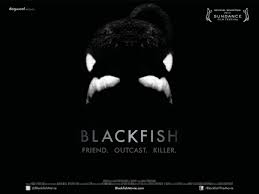Blackfish premiered at the 2013 Sundance Film Festival. While taking a broader look at the logistical problems and the ethics of keeping killer whales in captivity for human entertainment, the documentary focuses on one particular whale, Tilikum, that has been involved in the deaths of three humans.
We’ve all heard SeaWorld’s side of the story on the nightly news: trainer Dawn Brancheau dangled her ponytail by the pool and killer whale Tilikum couldn’t resist dragging her to her death by drowning.
Who among the general public thought then to question the initial account as a deflection of longstanding concerns by activists and to characterize it as a game of blame the victim?
If one criticism by SeaWorld and others who eschew animal rights is that Gabriela Cowperthwaite’s documentary Blackfish is one-sided and inaccurate as it pushes an animal rights agenda, then I would answer by saying that the documentary is open about its perspective and makes a convincing case that killer whales are smart, have more highly evolved family and community connections than most humans, and have a better quality of life in the wild than in captivity.
Whether or not you think Cowperthwaite makes a compelling case for SeaWorld’s mismanagement, it’s hard to refute the grizzled fisherman who laments the mistake of capturing young whales and separating them from their mothers years before. It is clear from the interview that he has been haunted by the sounds of their grief for a very long time.
Compelling, too, is the testimony of former SeaWorld trainers and OSHA investigators who have successfully argued that having trainers in the pool with the whales constitutes an unsafe work environment.
At a brisk 83-minute running time, the film is bracing and offers a lot to consider. I recommend it.
